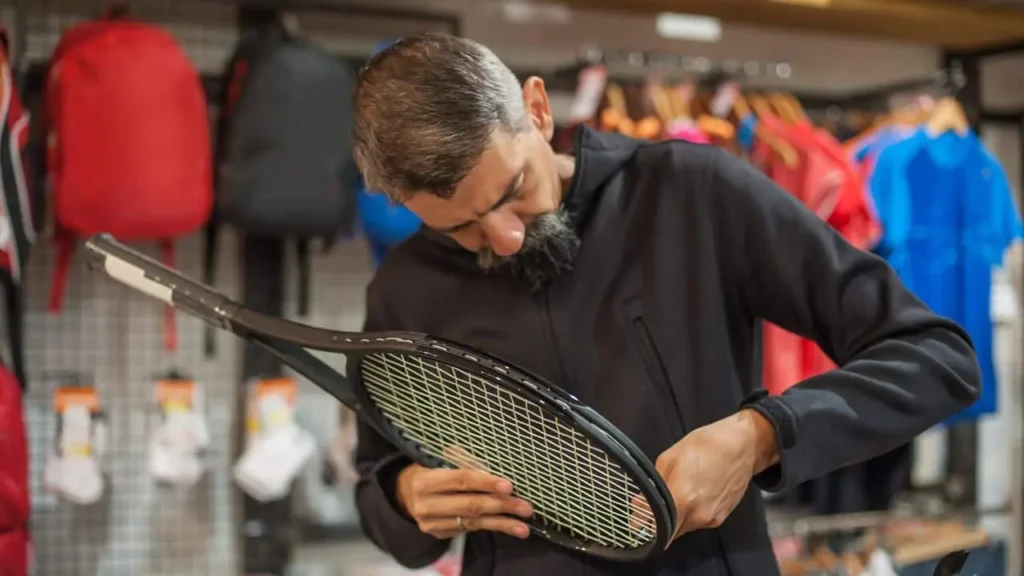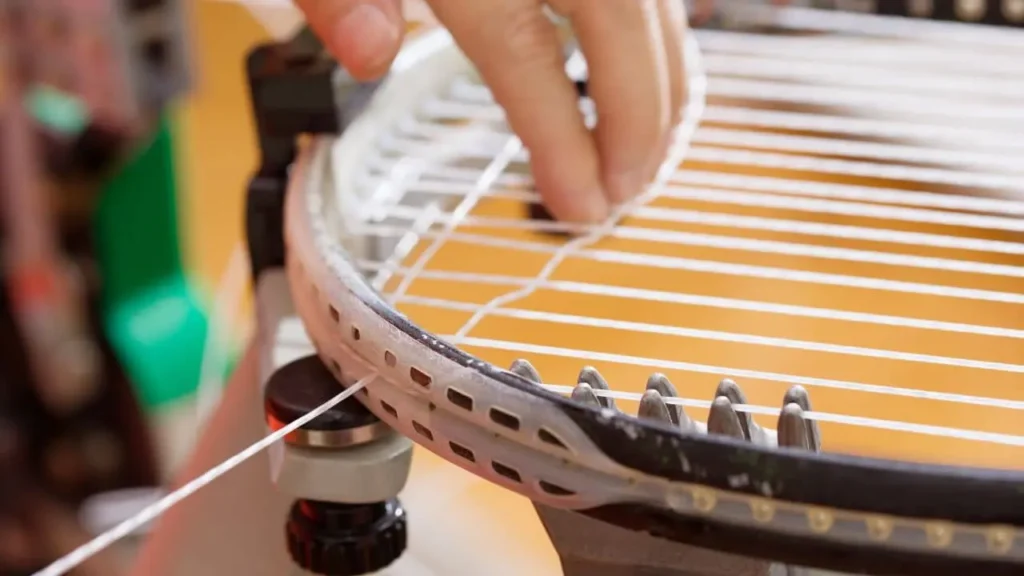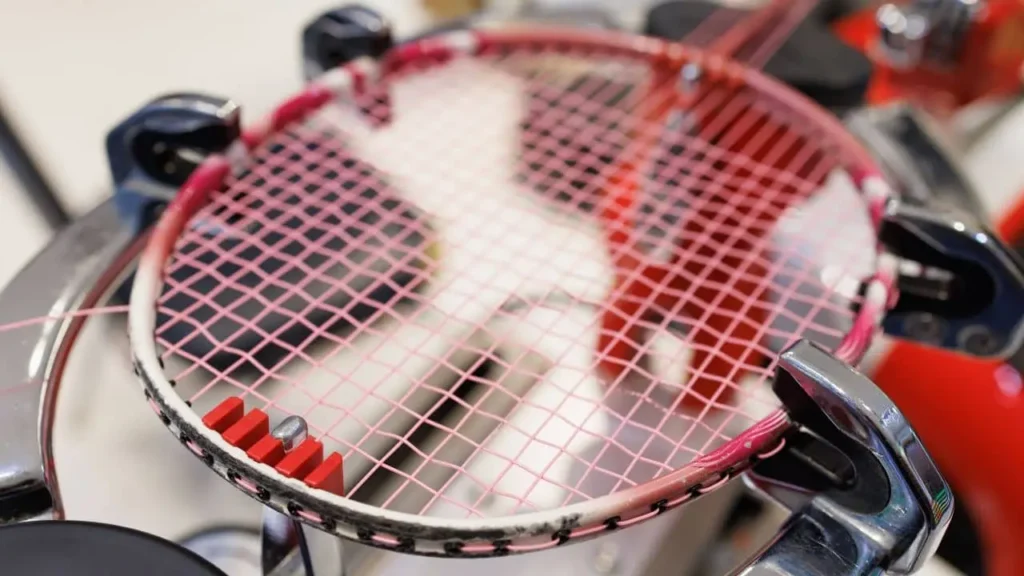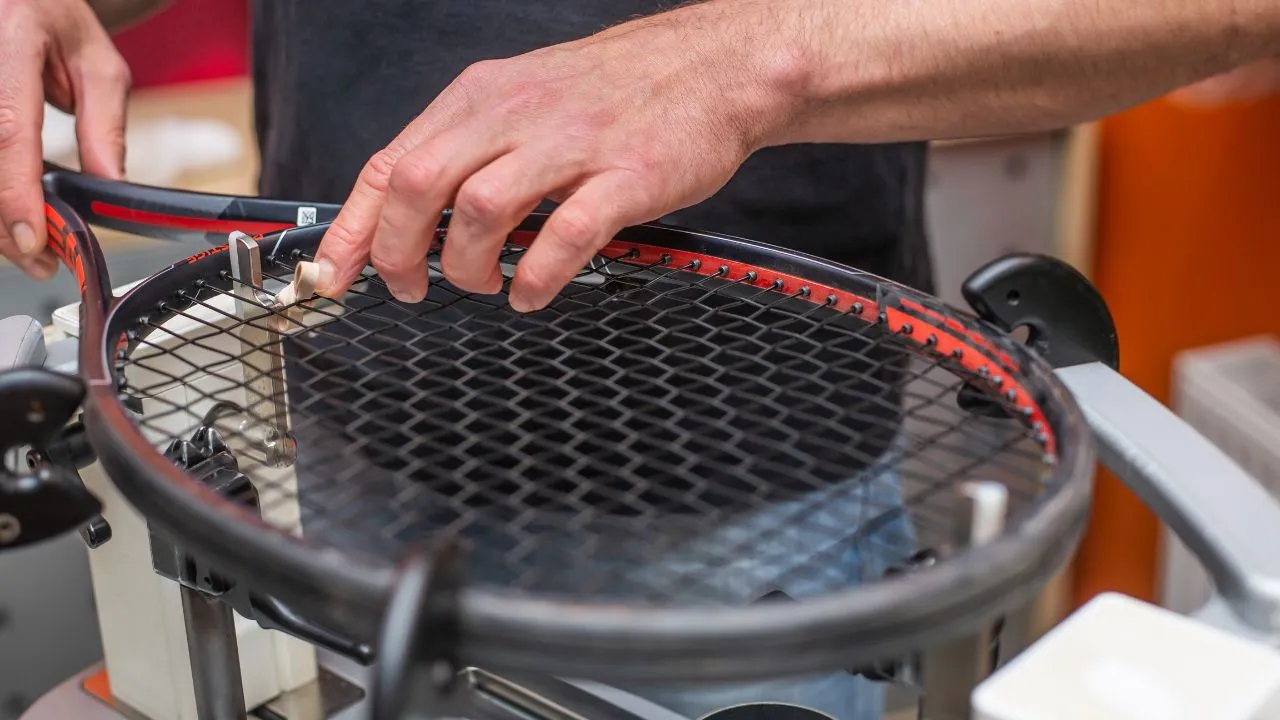The Tennis Racquet Stringing Cost is critical for players of all levels. Stringing prices vary from casual players to competitive players. It depends on the string type, the stringer’s experience, and the playing frequency. Synthetic gut stringing costs $5–$10 per set. It may range from $20 to $35 for beginners. Advanced players often spend between $40 and $80 per stringing. Club players pay $25 to $50 for stringing and labor.
Why do players need to restring their rackets? Restringing is important for players’ performance. They do this to improve ball control and feel and to maximize spin and power. It avoids string breakage and is customized to changing conditions.
You can choose from budget-friendly synthetic strings to high-end natural gut. knowing what to expect when stringing can help you make the best choice for your budget. Stringing will take about 30 to 45 minutes.
Table of Contents
ToggleWhy is Restringing Tennis Racket Important?
One of the most important aspects of tennis racket care is restringing. It has an immediate impact on how well you play on the court. Selecting the proper racket is a significant concern for many players. But the strings are necessary. They are the only part of the racket that makes contact with the ball. Over time, strings wear out, lose tension, and become less responsive. It hurts your game. Below are key reasons why restringing your tennis racket is essential:
- Better feel, power, and control are available with new strings.
- New strings offer better ball control and spin potential.
- New strings can prevent injuries.
- Maintaining consistent tension improves the feel and predictability of shots.
- Regular restringing can prevent damage to the racket frame.
- You can adapt to changing conditions, surfaces, or opponents
What happens if you don’t Restring your Racket?
If you don’t restring the racket, it can decrease your comfort and health. The strings are critical for performance and health difficulties. If you don’t restring you can face problems like:
- Your shots will lack precision and control.
- Reduced ability to generate power and spin in your shots.
- The racket feels dead, affecting touch and responsiveness.
- Increased risk of injury.
- Strings may break unexpectedly during a match.
- The racket feels less comfortable to play.
Types of Strings and Their Costs.
- Synthetic gut stringing is best for beginners and recreational players. It costs $5–$10 per set. It is the most affordable and widely used string.
- Multifilament strings are stronger and more comfortable for the arm. It is a favorite among players with arm or shoulder issues like tennis elbow. It ranges from $15–$40 per set.
- Natural gut strings are made from cow intestines. They provide the finest feel, power, and comfort. $30 to $60 is the price per set.
- Polyester/Co-Polyester Strings offer more durability and control but are stiffer. Their price ranges from $10–$25 per set.
- Hybrid strings combine two different types, natural gut or multifilament. For this, there are $20 and $40 startup costs.

Customizing your String Setup
Some stringers offer extra customization services. These are for players who wish to adjust the performance of their racket.
- Pre-Stretching Strings: This service can add around $5 to $10 to your total cost. Over time, it lessens the loss of string tension.
- Custom Tension: For specific tension for different racket parts, a surcharge is $5 to $10.
- Hybrid Setups: This results in a higher cost due to the complexity of the installation.
Stringing Labor Fees
Labor charges for stringing your racket vary based on the stringer and location. Average pay is between $15 and $25 for labor alone. This can rise to $30 to $40 for more experienced stringers or at specialty shops.
- Pro shop or Retail store fees are $10–$25 per racket.
- Tennis Club fees are almost $15–$30 per racket.
- Professional or highly experienced stringers charge $20–$40 per racket. These stringers also offer personalized stringing advice based on playing style.
Total Estimated Cost ( Stringing+ Labor Fees)
It is crucial to add both the labor charge and the cost of the strings to the restringing.
Budget Restringing (Synthetic Gut)
- String: $5–$10
- Labor: $10–$25
- Total cost: $15–$35
Mid-Range Restringing (Multifilament or Polyester)
- String: $10–$25
- Labor: $15–$30
- Total cost: $25–$55
Premium Restringing (Natural Gut or Custom Services)
- String: $30–$60
- Labor: $20–$40
- Total cost: $50–$100
Average Stringing fee based on Player Type
Beginners and recreational players choose synthetic gut or polyester. Because these strings are affordable. Including labor, their total stringing fee ranges from $20 to $35.
Intermediate players use polyester or multifilament strings. Their total cost for stringing can range from $25 to $50 on string and labor charges.
Advanced players or competitive juniors prefer hybrid setups or natural gut. These players often spend between $40 and $80 per stringing. Natural gut setups push the cost to the higher end.

How often should you Restring your Tennis Racket?
Stringing frequency depends on playing style, string type, and personal preference. How often you need to restring the racket also affects your total yearly costs of restringing. A general rule is to restring your racket as many times per year as you play in a week. For example, if you play 3 times a week, you should restring racket 3 times a year.
Frequency of play is an important factor to consider for stringing your racket. If you are a recreational player restringing your racket 2-4 times a year. If you are an intermediate player consider restringing every 6 to 8 weeks. Advanced/Competitive players should restring their racket once a month or more.
The type of string is also a major factor for players to string a racket. The natural gut string should be replaced every 4-6 weeks. Polyester strings should change in 6-8 weeks. Synthetic Gut and Multifilament last 6-12 weeks.
If you hit with a lot of topspin or power change the string for 4-6 weeks to maintain play.
High humidity and heat can degrade strings more. In such conditions, restring every 4-6 weeks after.
Cost-Saving Tips
If you want to save money on stringing. Take into account the following money-saving advice:
If you string frequently, buying strings in bulk can save you money. Many retailers offer discounts for purchasing many sets or reels of string.
Invest in a stringing machine (which can range from $200 to over $2,000). Learning how to string your racket can save you a lot of money over time.
Use more durable strings. Polyester or hybrid string setups last longer. It means you won’t need to restring as often.
Pro shops or online retailers offer discounts for restringing many rackets at once.
What's the Average Time Needed to String a Tennis Racket?
Stringing a tennis racket takes 30 minutes to an hour. It is dependent upon several factors, including the string type and stringer’s experience. Stringer experience and type of stringing machine influence how long is the stringing.
Electronic Stringing Machines are faster. They automate the tensioning process, reducing the time required to string a racket. In around twenty to thirty minutes, an electronic machine can complete a racket. Stringing a racket on a manual machine takes between 30 and 45 minutes. But a stringer using a drop-weight machine may take 45 minutes to an hour. It may take an extra five to ten minutes to string a polyester racket.
Rackets with open string pattern (16×19) string faster. The dense string pattern (18×20) takes an extra few minutes.

Common Myths and Misconceptions About Tennis Racket Stringing
There are a lot of myths and misconceptions about tennis racket stringing. These may have an impact on players’ perceptions of the value of restringing. Some common myths are as:
- Strings don’t matter for beginners. It matters for all players.
- The tighter the strings, the better. Higher tension is not always better.
- Professional players use extremely high tension. Players use tension based on their preference and style.
- Thicker strings are always more durable. Not always better for performance.
- You only need to restring when the strings break. Resstring before breakage.
- All strings are the same. Different in comfort and durability.
- All stringing machines provide the same quality of stringing. Provide different precision.
- Only expensive strings are good. Cheap strings also perform well.
When Should you Restring your Racket?
- As many times a year as you play each week, restring your racket.
- String the racket when they feel looser, or lose control and precision.
- Change when you see fraying or visible wear on strings.
- If a string breaks you need to restring your racket.
- Change it when your racket feels dead.
Top Places to Get Your Tennis Racket Strung
You can string your racket from local pro tennis shops. These tennis pro shops are located within tennis clubs. The staff of these shops is very experienced. These have a wide variety of string options. Their costs may be higher than larger retailers.
Large chain stores, Dick’s Sporting Goods, Sports Authority, or Decathlon offer stringing. They have convenient locations with flexible hours. They offer same-day or next-day stringing services at reasonable prices.
There are many online stringing services. Tennis Express, Do It Tennis, or Tennis Warehouse, provide online services. They have customizable stringing options and expert stringers. Shipping has caused a longer return period for them. Shipping charges are included in the total pricing.
Many tennis clubs or academies offer stringing services on-site for their members. They have quick turnaround times for regular players. They have higher fees for premium strings.
Many cities have independent stringers who offer personalized, high-quality service. They are often more flexible with scheduling and pricing.
Many Country Clubs and Resorts offer quick stringing services. If you’re staying at a country club or resort you can have such services.
Tennis Racket Stringing Machine
A tennis racket stringing machine is vital equipment. It allows professionals, coaches, and players to adjust string setups and tensions. Knowing the many kinds of stringing machines and their characteristics is essential. Stringing machine is a great investment for tennis players.
Players can string their rackets at home. You can buy a machine depending on budget, playing needs, and stringing frequency. If you are a frequent player a stringing machine can save you money in the long run.
Conclusion
When someone thinks about restringing then price and location come to mind. The average price of stringing is $15 to $70. With the type of string price of stringing changes. Synthetic gut, multifilament, and hybrid strings cost different. Budget synthetic strings and basic labor will keep costs lower. Premium strings like natural gut or hybrid setups, will push costs toward the higher end.
Frequent players, competitive ones, may need to restring more often due to wear and tear. To save money you can buy your stringing machine.
FAQs
Different questions arise in your mind reading restringing. About the budget, the Site where to resting, and the best stringing machine and strings come into mind. Here are some Frequently Asked Questions to answer these problems:
Yes, the type of string impacts the cost. Synthetic strings like nylon or multifilament are affordable. Premium options like natural gut or polyester hybrid setups will be more expensive. The cost of strings can range from $5 to $50 or more, influencing the stringing.
You can use different types of strings for your racket. But each type affects your performance differently. For instance, beginners might opt for a durable and affordable synthetic string.
String tension itself doesn’t affect the fee of stringing. Yet, the stringing process for very specific tensions may need more expertise. Some stringers may charge more for labor if the job requires extra care.
Yes, you can restring your tennis racket at home. It requires the right equipment, knowledge, and practice. It would help if you had a stringing machine and a learning process.
If you provide your strings, you’ll only pay for the labor. Labor costs between $10 and $25, depending on the stringer or pro shop.
Some stringers may charge extra for advanced or custom stringing patterns, such as hybrid string setups or unique tension requirements. This additional cost may go from $5 to $15.

